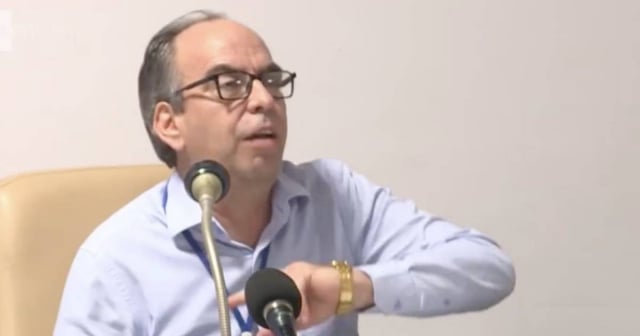The Cuban regime accused the United States of creating "extraordinary and artificial stimuli" to encourage the migration of its citizens, attributing responsibility for the migration crisis unleashed in Cuba in the last three years.
“At the regional event on migration held today in Mexico, the Cuban government said that its population emigrates due to "extraordinary and artificial stimuli" created by the US: 1- the blockade; 2- border admission privileges; 3- residence privileges due to the Adjustment Law,” Project Inventory reported on its social networks.
The accusation was made by the Vice Minister of Foreign Affairs (MINREX), Carlos Fernández de Cossío, who traveled arrived in Palenque, in the state of Chiapas, accompanied by the chancellor Bruno Rodriguez Grill and the Cuban ruler, Miguel Diaz-Canel.
The Cuban delegation traveled to Mexico this Sunday to participate in a summit on irregular migration, with the aim of trying to stop the unprecedented number of immigrants arriving in the United States through illegal means.
“There are extraordinary and arguably artificial factors that influence this migration [of Cubans]. First of all there is the economic blockade (…) a policy aimed at depressing income, generating poverty, hunger and trying to provoke political change,” said the vice chancellor.
According to Fernández de Cossío, “naturally this causes a stimulus for migration, for people who want to leave that scenario.”
“There is a second factor, which is an active policy of encouraging Cuban emigration through irregular channels, which offers privileged treatment at the US border, unique for Cuban emigrants,” the official said.
This “second factor” has political motivations, explained Fernández de Cossío. “If a Cuban claims at the border that he has a 'credible fear' to return to their country of origin, they have much greater possibilities than emigrants from any other country in the world to be accepted in the United States. And that, of course, the Cuban emigrant knows.”
Thirdly, the vice minister of MINREX referred to the “Cuban adjustment law”, a policy that “offers the Cuban migrant the unique privilege of being able to normalize their situation and become a permanent resident one year after entering the United States.”
“These three factors constitute extraordinary and artificial stimuli for Cuban emigration. It is in the hands of the US to solve it. You could act if you are interested in solving the problem,” said Fernández de Cossío.
His statements expand those of Díaz-Canel, who This Sunday he blamed the US government for the immigration crisis in Central America, ensuring that they stimulate the irregular migration of Cubans.
"Cuba has repeatedly warned about the responsibility of the United States government with the permanent incitement of irregular migration of Cubans who arrive or intend to arrive at its borders, with measures of economic suffocation and facilities for migrants from our country," said Díaz. -Canel on Twitter.
For the rest, neither the leader of the "continuity" nor the official of his regime contemplated the possibility that the Cuban migration crisis has "internal factors", or any connection with the deterioration of the standard of living in Cuba and the acute economic crisis generated under the management of your government.
The Cuban regime continues to insist on repeating its propaganda, blaming the blockade and the policies adopted by the United States to protect those fleeing the dictatorship, for the stampede of hundreds of thousands of Cubans in the last two years.
The Migration Summit in Mexico "Meeting for a Fraternal Neighborhood and in Search of Wellbeing" concluded this Sunday. The event was called by the president Andrés Manuel López Obrador to bring a common position to the president of the United States, Joe Biden.
11 Latin American countries participated, including Mexico, Colombia, Haiti, Honduras, Venezuela, Belize, Costa Rica, Ecuador, Guatemala and Panama. They signed a joint declaration that has 13 agreements.
What do you think?
SEE COMMENTS (3)Filed in:
